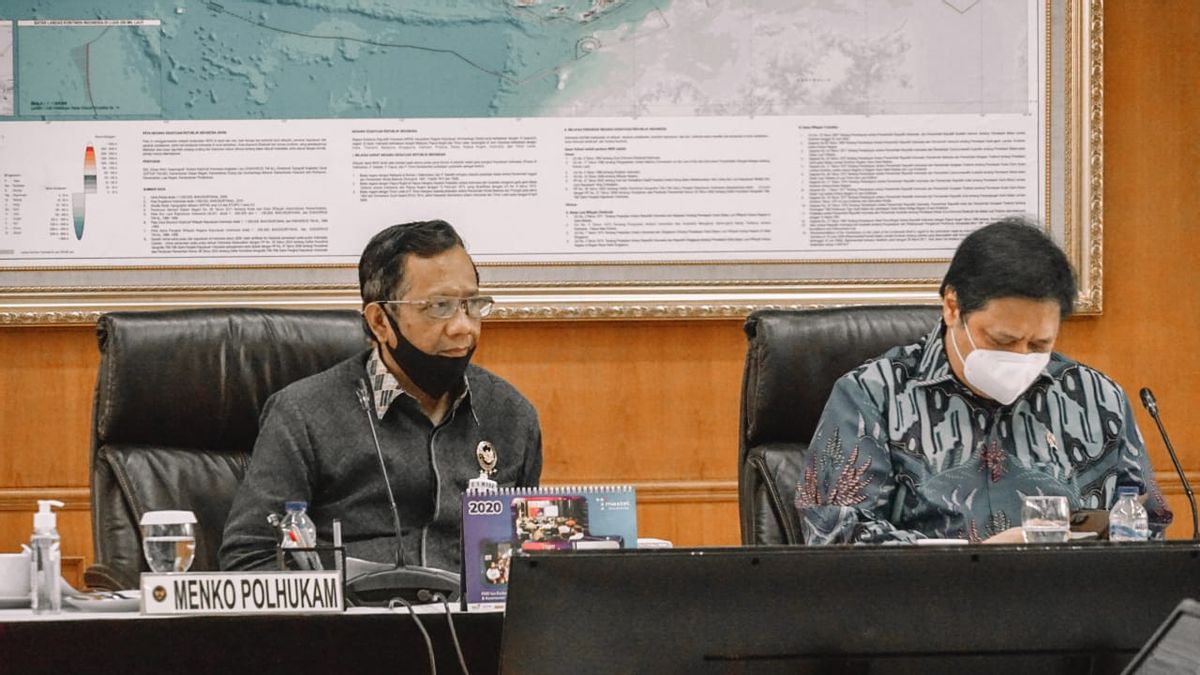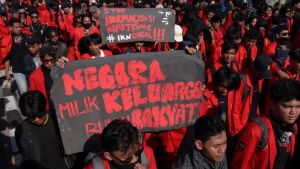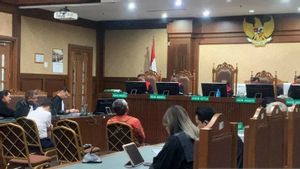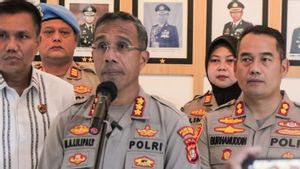JAKARTA - The Coordinating Minister for Political, Legal and Security Affairs (Menkopolhukam) Mahfud MD initiated a meeting between the government and trade unions to discuss the Work Creation Omnibus Law Draft Bill (RUU).
There were a number of trade union figures who attended, including KSPSI President Andi Gena Nuna Wea, KSPI President Said Iqbal, and KSBSI Chairman Elly Rosita.
Meanwhile, from the government, besides being represented by Mahfud MD, there were also the Coordinating Minister for the Economy Airlangga Hartarto, Minister of State Secretary Pratikno, Minister of Manpower Ida Fauziah, and Head of the Presidential Staff Office Moeldoko.
"This meeting is so that we can exchange ideas about the Omnibus Law for Manpower. With the belief, that we have the same thoughts to improve the dignity and welfare of workers," Mahfud was quoted as saying in his written statement, Wednesday, June 10.

On the same occasion, Coordinating Minister for the Economy Airlangga said, the outbreak of COVID-19 had a wide impact on workers. So, in addition to focusing on the health sector to suppress the spread of the virus, the government also continues to try to break the chain of termination of employment (PHK).
"This requires close cooperation with trade unions," said the Golkar Party politician.
The hope of the trade unionKSPSI President Andi Gena Nuna Wea hopes that a technical team on manpower issues can be formed soon. So, everything related to employment in the Work Creation Omnibus Law Bill can reach an understanding.
"We hope that a technical team can be formed soon, a technical team whose contents are tripartite, there is a labor union, there is a Kadin and there is also a government that will sit together and talk together," he said.
Positive hopes were also present from the President of KSPI Said Iqbal. He did not deny that in the future there would be a pattern of good working relations between workers and the government. "And it turns out that this happened during a pandemic."
In order for all trade unions to convey their aspirations, there are two dialogue sessions, namely the day session and the evening session. During the daytime session, 9 organizations or trade unions were present. Meanwhile, the evening session involved 7 trade unions and laborers.
This dialogue is the third meeting. Previously, the same dialogue had also been held in March and April to hear input from workers and laborers regarding the Omnibus Law on Job Creation.
Questioning the meeting was held in the middle of the morningExecutive Director of the Institute for Development of Economics and Finance (Indef), Tauhid Ahmad said, the Omnibus Law Bill on Job Creation indeed needs to be discussed and must involve other labor unions, not only labor organizations.
"It needs to involve various organizations, other organizations that are concerned with the bill. Not only workers," said Tauhid when contacted by VOI, Wednesday, June 10.
In addition, these discussions must be conducted in an open, transparent and accountable manner. So that, in the meeting, each article can be discussed in order to produce the best decision.
He also considered that the deliberation of the draft legislation should not be carried out in a hurry so that the results were maximum.
However, Tauhid said, even though the meeting was successful, it did not make investment easy to enter during the mid-week period or during the recovery process. This is because investors also see several other factors, such as infrastructure, tax services, and the issue of corruption which is still a problem.
Meanwhile, Core Indonesia Executive Director Mohammad Faisal considered that the meeting to discuss the Work Creation Omnibus Law Bill in the middle of the COVID-19 event was unnecessary.
According to him, whatever regulations and stimulus to encourage investment that the government is planning, including the Omnibus Law Bill, will not be effective at this time. According to Faisal, the government should focus more on tackling the epidemic to save the economy.
"So there is absolutely no urgency to discuss, let alone speed up the ratification of the current Omnibus Law. Even if the Omnibus Law is successfully passed, it will not provide a way out of the current economic pressure. It must be postponed," said Faisal.
Meanwhile, Executive Director of the Indonesia Political Opinion (IPO) Dedi Kurnia Syah said that this discussion should be postponed.
He is not a problem because currently there is a COVID-19 outbreak. According to Dedi, this design should be postponed because of the urgency of making regulations in it.
"Reading the draft currently under discussion does seem to impose one's will through the summarization of other laws," he said.
He considered, this bill seemed to be more inclined towards the corporate side, not the working community. "For this reason, this discussion is not good because it tends to be oligarchic, not because of the COVID-19 issue," said Dedi.
"Even though under certain conditions, it is less beautiful when there are things that are more crucial and have a direct impact on society while state officials are busy with elite defense," he concluded.
The English, Chinese, Japanese, Arabic, and French versions are automatically generated by the AI. So there may still be inaccuracies in translating, please always see Indonesian as our main language. (system supported by DigitalSiber.id)










